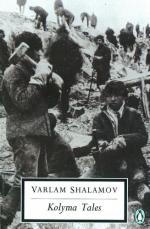
|
| Name: _________________________ | Period: ___________________ |
This test consists of 5 short answer questions, 10 short essay questions, and 1 (of 3) essay topics.
Short Answer Questions
1. What did the narrator recall had been confiscated in Magadan? ("Esperanto.")
2. Stories of what bridge made Golubev's boss ecstatic? ("Magic.")
3. What kind of injection did the chief in "Chief of Political Control" need?
4. What train station was the location of "The Train" ?
5. What did the narrator state was worse than criminals who robbed him? ("Esperanto.")
Short Essay Questions
1. According to the narrator in "The Lawyer's Plot," what were the three ways out of the mine?
2. What was the narrator shocked by about the blade of the bulldozer? ("Land-Lease.")
3. What game did the lieutenant and the narrator play during "The Train"?
4. Where did the narrator hide his money during his train ride? ("The Train.")
5. What "magical powers" did Stukov have? ("Magic")
6. Why did the narrator in "My First Tooth" state that it was easier to bear something after you write it down? ("My First Tooth.")
7. What did the bulldozer, in "Land-Lease," come to be used for?
8. Why did Gusev break the window in the basement of the former monastery? ("My First Tooth.")
9. Why were the convicts unable to eat the horse meat in "Esperanto"?
10. Why was Stukov contemptuous and delighted by the shifty-eyed man's admittance about his being an informant? ("Magic")
Essay Topics
Write an essay for ONE of the following topics:
Essay Topic 1
Given the dehumanizing circumstances that the narrator relayed throughout the text, many instances of true humanity shone through. Discuss three examples where humanity won out over animalistic behavior in the text.
Essay Topic 2
In "A Piece of Meat," the narrator stated that "the rudimentary organ turned out not to be rudimentary at all, but essential, functioning, life-saving." Find, and discuss, three examples where a rudimentary object turned out to be "essential, functioning and life-saving."
Essay Topic 3
The narrator in "My First Tooth" stated that "even if you can't get something published, it's easier to bear a thing if you write it down. Once you've done that, you can forget." Do you agree with the narrator's statement? Why?/Why not? What is healing about writing something down? How may it help?
|
This section contains 785 words (approx. 3 pages at 300 words per page) |

|




